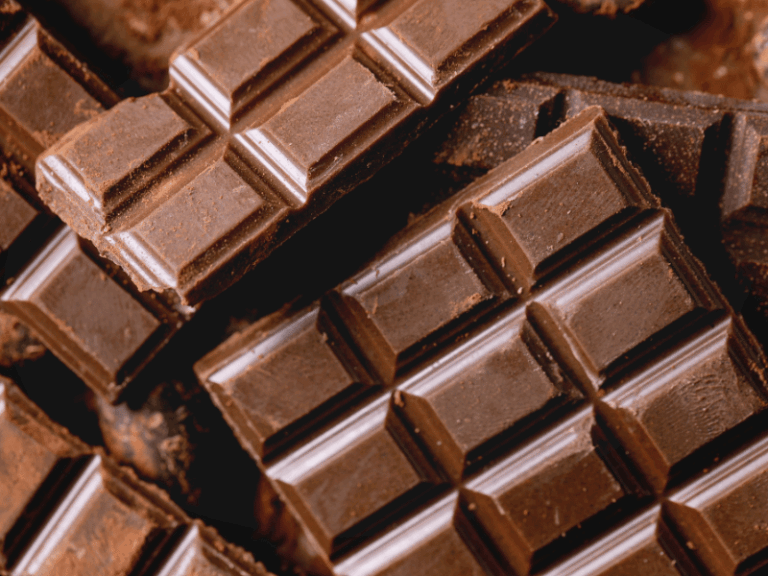Chocolate is one of those universal loves. Whether it’s a square of dark chocolate after dinner, a mocha to survive the workday, or that “emergency” stash in the desk drawer, cravings for chocolate are real – and very common. But why do we want it so badly? And is it just an indulgence, or can chocolate actually be good for us?
Before we answer why we crave chocolate, it’s important to understand what happens to us when we eat chocolate. So…
What Happens In My Brain When I Eat Chocolate?
Long Story Short: Chocolate doesn’t just taste good, it makes you feel good by boosting hormones that make you feel good.
Scientific Explanation: Chocolate has a direct line to your brain’s reward system, which is why it feels so comforting the moment it melts on your tongue. The cacao inside contains theobromine, a gentle stimulant that boosts alertness and circulation, along with a touch of caffeine that sharpens focus and energy (1). On top of that, cacao provides tryptophan, an amino acid the body uses to make serotonin, one of the “happiness hormones” (2). Even the flavanols in chocolate play a role by improving blood flow to the brain, which may enhance clarity and reduce fatigue (3). Together, these compounds create more than just flavor, they spark a real neurological response that explains why chocolate can lift your spirits, especially when you’re stressed or tired.
Why Am I Craving Chocolate?
There are many reasons why you might be craving chocolate:
- Stress or Emotional Triggers – If you’re feeling overwhelmed, your brain might crave a comforting chemical lift.
- Low Blood Sugar or Low Energy – Chocolate is an easily digested source of sugar and caffeine, so if your energy’s dipping, your body might be looking for a quick recharge.
- Magnesium Deficiency – Chocolate, especially dark chocolate, is rich in magnesium. If your body’s running low, it might steer you toward chocolate as a quick fix.
- Hormonal Fluctuations – During menstrual cycles or hormonal shifts, chocolate cravings often spike due to changes in serotonin and dopamine levels.
- Habit or Sensory Cues – Sometimes it’s not your body, it’s your environment. Seeing, smelling, or even thinking about chocolate can trigger cravings through sensory memory.
While it’s fine and could even be healthy to have chocolate in moderation, if you’re experiencing a craving, your body is asking you to check in with it. Before reaching for chocolate to satisfy your craving, it’s important to ask yourself a few questions:
- How do I feel right now? Am I feeling stressed or overwhelmed? Chocolate can offer a quick emotional lift, but it’s often a temporary fix for deeper feelings. Before reaching for it, pause and ask: What do I really need right now -comfort, distraction, or connection? Whether or not you indulge, take a moment to care for the emotion behind the craving.
- Am I tired, under-fueled, or running on caffeine and adrenaline? Chocolate can give a quick energy boost, but it won’t sustain you. If you haven’t eaten much today, try a balanced meal first. Or pair a small piece of chocolate with protein or fiber, like nuts or fruit, to keep your blood sugar steady and avoid a crash.
- Am I experiencing symptoms of low magnesium? If you’re also craving foods like nuts, leafy greens, or bananas, or if the chocolate craving sticks around even after indulging, it might be a sign of low magnesium. Try adding more magnesium-rich foods to your meals, or consider a supplement if needed.
- Is this craving linked to my menstrual cycle? Chocolate cravings often spike around your period and that’s totally normal. Hormonal shifts can lower magnesium and serotonin, both of which chocolate helps replenish. Cultural associations also play a role (4), so it’s okay to honor the craving while staying mindful of what your body truly needs.
- Am I in a situation where I normally eat chocolate? Some situations and times are associated with chocolate and can trigger a craving even if your body doesn’t physically need it. For example, watching a movie, studying late at night, or walking past a bakery may cue your brain to expect chocolate simply because it’s part of a familiar routine. Holidays like Valentine’s Day or Easter, with their heavy marketing and emotional undertones, can also amplify cravings. If you recognize that your craving is situational, try pausing to ask whether you’re truly hungry or just responding to a habit or emotional cue. You might find that a glass of water, a short walk, or a different treat satisfies the moment just as well.
What Should I Do When I Crave Chocolate?
Cravings aren’t the enemy, they’re the messengers. Once you’ve checked in with yourself and explored the root of your chocolate craving, you get to choose how to respond. Sometimes that means honoring the craving with intention. Other times, it means redirecting it with care.
Here are a few mindful ways to respond:
- Savor, Don’t Scarf – If you decide to indulge, choose quality chocolate and eat it slowly. Let it melt, enjoy the texture, and notice how it makes you feel. Satisfaction often comes from presence, not quantity.
- Pair It Wisely – Combine chocolate with protein or fiber, like almonds, chia pudding, or fruit, to stabilize blood sugar and avoid the crash.
- Shift the Mood – If the craving is emotional, try a mood-boosting alternative: a walk, a warm shower, journaling, or calling someone you trust.
- Nourish First, Treat Later
Eat a balanced meal first. You might find the craving fades or that you enjoy the chocolate more when your body feels supported. - Explore Magnesium-Rich Alternatives
Try dark leafy greens, pumpkin seeds, a magnesium-rich smoothie, or a magnesium supplement. These can satisfy your body’s deeper needs while still feeling indulgent.
Conclusion
Craving chocolate isn’t a weakness, it’s your body’s way of sending you a message. Sometimes that message is simple: “I’m stressed, give me comfort.” Other times, it’s more physical, like a dip in energy, shifting hormones, or even a need for more magnesium. And of course, sometimes it’s just habit.
The good news is that chocolate itself, especially dark chocolate rich in cacao, isn’t just empty indulgence. Thanks to its flavonoids, it can support circulation, brain function, and mood. When enjoyed mindfully, chocolate can be both satisfying and beneficial.
The key is learning to pause and check in with your body before unwrapping the next square. Ask what your craving is really about, and then decide whether to honor it with chocolate or to give your body something else it might be asking for – like rest, a nutrient-rich meal, or extra magnesium. If you do choose chocolate, make it a ritual: savor it slowly, pair it with something nourishing, and enjoy it without guilt.
When cravings are persistent, it may be worth looking deeper. Supporting your stress response, balancing your diet, and filling in nutritional gaps can make chocolate an occasional treat rather than a daily need. That’s where solutions like Research Verified Magnesium Complex or Ashwagandha can help, giving your body what it’s really after so chocolate stays a joyful addition – not your only lifeline.





Comments are closed.